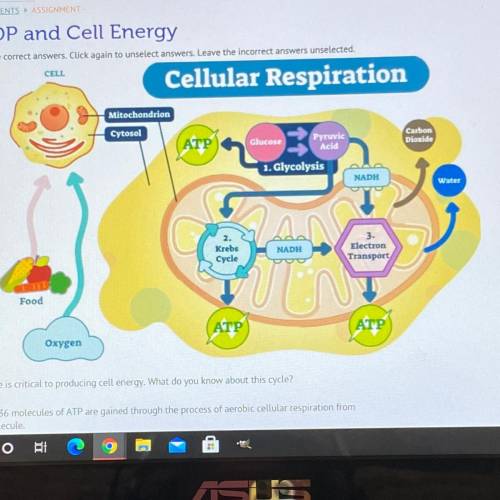
Biology, 28.10.2020 22:40 milkshakegrande101
The ADP-ATP cycle is critical to producing cell energy. What do you know about this cycle? (More than one answer)
1. On average, 34-36 molecules of ATP are gained through the process of aerobic cellular respiration from
one glucose molecule.
2. When phosphate is added to ADP, free energy from food sources is stored in the phosphate bond,
producing ATP.
3. The hydrolysis of ATP to ADP is reversible.
4. When a phosphate group is removed from ATP by hydrolysis, ADP is produced and energy is stored for
cellular processes.
5. Only aerobic cellular respiration is used to break down glucose into ATP that is usable by the cell.
6. Glycolysis is the first step in both aerobic and anaerobic cellular respiration.


Answers: 3


Other questions on the subject: Biology



Biology, 22.06.2019 09:30, goopatogen5889
Which statement names a physical property of wood? wood does not rustwood can burnwood can rotwood is softer than coal
Answers: 2

Biology, 22.06.2019 13:20, abolton04
Imagine a self-reactive t cell that has not undergone clonal deletion in the thymus (that is to say, it has escaped central tolerance). if it encounters self antigen in the absence of an infection or inflammation, what will happen to this self-reactive t cell? (select two answers) (a) the t cell undergoes clonal expansion. (b) the t cell gains effector functions. (c) the t cell undergoes apoptosis. (d) the t cell becomes activated. (e) the t cell becomes anergic.
Answers: 1
You know the right answer?
The ADP-ATP cycle is critical to producing cell energy. What do you know about this cycle? (More tha...
Questions in other subjects:





Mathematics, 24.06.2021 03:40

Mathematics, 24.06.2021 03:40

History, 24.06.2021 03:40


Mathematics, 24.06.2021 03:40

Mathematics, 24.06.2021 03:40




